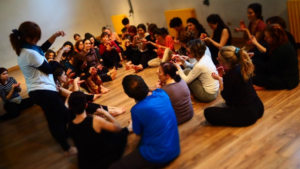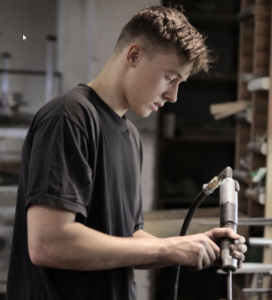Fixing the Broken Care Economy
Guest Blog post written by Elias Crim
In a turbulent socio-political moment, it seems like a good time for us to dream out loud together.
Let’s talk about what could happen if the vision of the maintenance movement and the right to repair are applied to our enormous care economy in the U.S., specifically, the provision of social care in our own communities.
We’re talking about repairing our local networks of, say, childcare, eldercare, and disabled care–without resorting primarily either to government or the market for solutions.
What I’m describing is a way of taking “broken world thinking” into social services which could be organized, created, delivered, and owned by fellow members of our local communities.
In fact, this is not a utopian dream: it’s a type of social innovation at least a half-century old and very much at work in places like northern Italy, Quebec, South Korea, Barcelona, and elsewhere. The business form for delivering this democratic, locally-controlled and high-quality care is called a social cooperative.
Social cooperatives have usually arisen as a community response to austerity measures around social care. Like worker co-ops or consumer co-ops, they feature democratic control and governance. But their primary focus is community benefit more than worker equity, somewhat like the non-profit model we’re familiar with in the U.S..
Unlike our non-profits, however, social co-ops are multistakeholder in form—i.e., they are governed by boards potentially representing the care providers, the care recipients, volunteers, the larger community, local funders, and local government.
Here’s how they work on the ground in Italy.
Social innovation is the value-add that enables the country’s 12,000 social cooperatives to offer social services which are co-created by the users of those services in democratically owned and operated enterprises. (We should note that this type of co-op does not exist as yet in the U.S.)
One of the bright stars in this culture of social innovation is the Pandora social coop, founded in a suburb of Milan in 2012 by a group working with recovering alcoholics. It falls into the category of coops focused specifically on workforce reintegration for marginalized groups.

After initially launching a piadineria (a café making flatbreads), Pandora’s small team shifted to a cleaning service, eventually adding a program of five workshops teaching different levels of technical skills for specific contract work in Milan’s Monza prison, offered in both the men’s and women’s units.
In 2022, Pandora acquired the startup business Streeteat—a mobile restaurant with an eye on the 2026 Winter Olympics in Milan, according to Pandora’s founder and social entrepreneur Davide Damiano. The coop is now up to 100 employees, of whom 70% are from disadvantaged communities—former drug addicts, former prisoners, current prisoners, etc.

Italian law mandates quotas for employing disabled workers by companies of a certain size, as well as requiring professional training and workplace accommodation. Companies with 15 to 35 employees, for example, must ensure that 7% of their workforce are disabled workers.
A provision of that legislation allows social coops like Pandora to be sub-contracted by companies to take over the 7% requirement.
Let’s zoom out for a moment to think about what we’re seeing here. First, social coops are not in themselves an innovation: the first ones were organized in the 1980s as a response to threatened government cutbacks in the social safety net.
Their remarkable success comes from their history of delivering high-quality care, co-created with care recipients (as well as family members and community members), their democratically-run workplaces, and their ability to offer dignified work.
Second, Pandora’s capacity to acquire other small businesses and then deploy them for its social purposes obviously requires a kind of entrepreneurial savvy which would be unfamiliar to most U.S. non-profits, for example, given the IRS’s constraints around engaging in profit-making activities, even if mission-related.
While we in the U.S. have worker coops which provide social care, we do not have social coops (yet) operating similarly to the Italian model, with their co-creation process and multistakeholder, democratic governance.
But a number of groups, including the Rocky Mountain Employee Ownership Center in Denver, are working to “import” the model. Before long, we may have a new ways to offer sustainable and dignified care work in our communities and with a high level of quality.
Even beyond that transformative vision, social coops restore a critical missing dimension in most capitalist enterprises: relationality, i.e., the freedom from the transactional mindset that genuine care requires.
Guest Blog Post written by Elias Crim

Elias Crim is an editor, writer, translator and publisher who founded the national blog Solidarity Hall in 2013 and the podcast Dorothy’s Place (with co-host Pete Davis) in 2017. He has written for Hedgehog Review, the American Scholar, Shareable, Non Profit Quarterly, Front Porch Republic, and other publications. He is co-host with Pete Davis of the new podcast Lost Prophets about recovering prophetic voices from the mid-century.